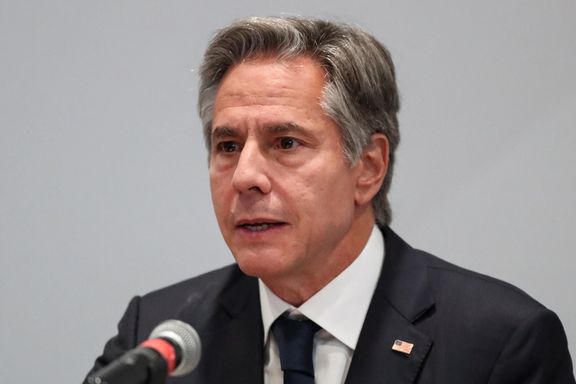JCPOA Critics Say Nuclear Deal Is Dead As US, Iran Look Past November

Opponents and critics of the 2015 Iran nuclear deal are seeking to take advantage of the pause in talks that will last at least until US midterm elections.

Opponents and critics of the 2015 Iran nuclear deal are seeking to take advantage of the pause in talks that will last at least until US midterm elections.
The Times of Israel Monday quoted a “senior Israeli official” travelling with Prime Minister Yair Lapid in Berlin proclaiming the death of talks to revive the 2015 deal, the JCPOA (Joint Comprehensive Plan of Action). The official said the Israeli delegation had given “information to the Europeans that proved the Iranians are lying while the talks are still happening.”
The official called on Washington to “put a credible military threat, and everyone to push for a better agreement.” He or she said that discussions were “no longer in Malley’s hands,” with the US special envoy Robert Malley shunted aside. A State Department subsequently denied that Malley had eased out or that the US position had “toughened,” the Times of Israel reported.
Antony Blinken, the US Secretary of State reiterated Monday that it was not possible to give a timeline for the JCPOA talks. US officials, including Malley as well as Blinken most recently in Brussels last Thursday, have said they will continue efforts to revive the 2015 agreement as long as this suits US national interests and has non-proliferation benefits.
In an editorial Tuesday, Bloomberg, whose criticisms of the JCPOA go back to its being signed in 2015, argued that the US should act as though the deal were dead even though “most observers now expect talks to languish at least until after the November midterm elections.”
Bloomberg argued it was time for the US to switch “to so-called Plan B,” which the paper said “might help persuade Iran to back off its most unreasonable demands — and will put the US in a better position to deal with the consequences if it doesn’t.”
Plan B – ‘closing loopholes’
Bloomberg explained its notion of ‘plan B’ as “closing sanctions loopholes that have allowed Iran to continue to sell millions of barrels of oil, primarily to China.” This would apparently involve using executive orders signed by President Donald Trump after he withdrew the US from the JCPOA in 2018 to impose penalties on Chinese entities importing Iranian crude or in other trade with Tehran.

‘Plan B’ would also involve, Bloomberg said, accelerating efforts to “link the air defense networks of Israel and friendly Gulf nations,” and “speeding delivery [to Israel] of key systems such as refueling tankers for long-range air strikes,” presumably for bombing Iranian nuclear or other targets.
“It's no surprise that Iran is using this time to strengthen its capabilities for the future,” Bloomberg concluded. “The US and its partners should do the same.”
Mohammad Marandi, a spokesman for Iranian nuclear negotiators, advised viewers of Al-Jazeera television Sunday not to lightly dismiss prospects of JCPOA revival. Tehran and Washington were, he said, still “very close” to agreement.
Had the US accepted Iran’s August 15 response to a European text circulated August 8 in an effort to conclude 18-month talks, “we would have had a deal by now,” Marandi said. Against EU and US claims Iran subsequently hardened its stance, Marandi argued it had rather tried to close “loopholes” over sanctions remaining in the text and reminded viewers European Union foreign policy chief Josep Borrell had called the August 15 Iranian response “reasonable.” Lapid at the time called it “a bad agreement.”
The Iranian spokesman claimed on-going enquiries made by the International Atomic Energy Agency (IAEA) into Iran’s pre-2003 nuclear work — when, he said, Iran “purchased a couple of old models of Pakistani centrifuges to use them to develop their own” — could easily be resolved if the matter were not “politicized” by members of the IAEA governing board, which currently meets in Vienna.
‘Internal issues that team Biden faces’
“This delay is due to internal issues that team Biden faces,” Marandi said. “They’re afraid that if they sign on this document before the [November 8 mid-term Congressional] election, they’ll come under criticism from Trump and…allies in the Israeli regime…The problem is that the Americans don’t want this discussed in Congress right now.”
Hillary Mann Leverett, a former state department official, told Jazeera the US position had been shaped by Biden advisers calculating by early August that “the Democrats had a better chance of keeping at least the Senate in the upcoming November 8 elections,” making the administration “even more hesitant” over JCPOA revival for fear of “opening up a wide prospect of criticism from 2024 presidential candidate Trump and other Republicans.”
Mann Leverett also highlighted domestic politics in Israel, where with November 1 parliamentary elections looming Lapid is trumpeting his approach to Iran as more effective than that of rival Benjamin Netanyahu. She warned that both Washington and Israel lacked any real sense of urgency over the Tehran’s expanding nuclear program given years of predictions that Iran was on the verge of developing atomic weapons.